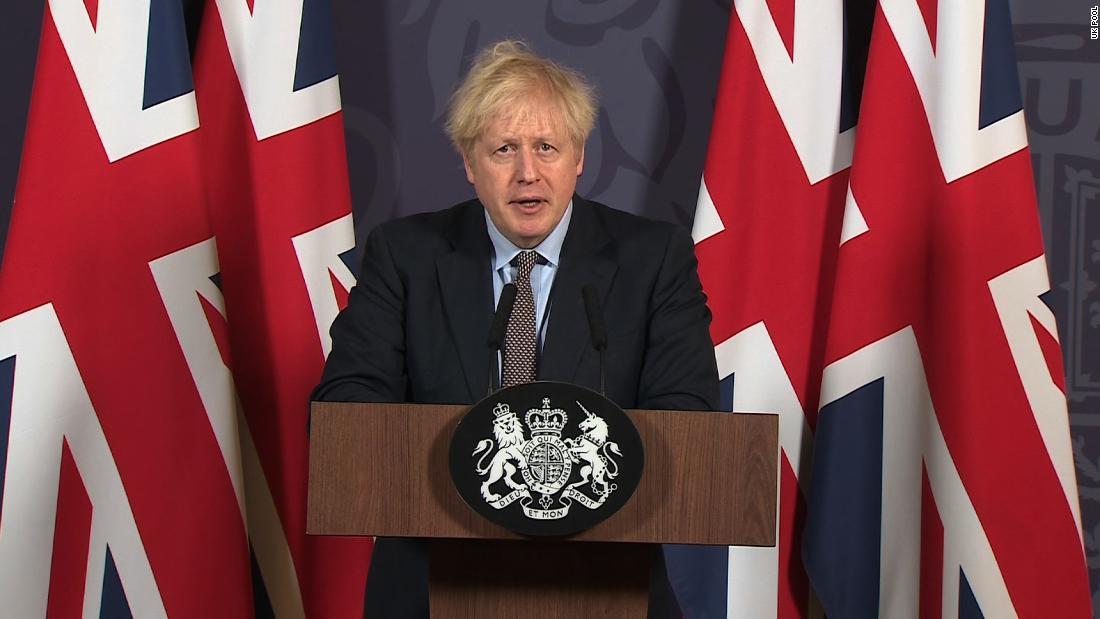The end of the transition period, four and a half years after the majority in the UK voted to leave the European Union, is a significant moment in the country’s history. After almost five decades as part of the bloc, the United Kingdom will now open a separate path.
UK Prime Minister Boris Johnson said on Thursday that Britain will be an “open, generous, outward-looking, internationalist and free trade country” that is “free to do things in a way different and, if necessary, better “than the EU.
“We have our freedom in our hands and it is up to us to make the most of it,” Johnson said during his New Year speech, just hours before the end of the transition period.
Opening the debate on the bill on Wednesday, Johnson told members of Parliament that the deal “would open a new chapter” and allow the UK to take “control of our laws and our national destiny”.
But critics warn that the UK economy will suffer as a result of Brexit, with many companies unprepared for the changes that will come, especially when the country staggers under the impact of the coronavirus pandemic.
Now that the UK has left the single market and the customs union, goods crossing the border will be subject to customs and other controls. Delays and interruptions can occur when transporters discover that they do not have the right paperwork or that new software systems collapse under pressure.
Keir Starmer, leader of the main opposition party, the Labor Party, warned last week that “there are serious questions about the government’s preparedness for the new deals” after the talks went down the drain.
He told labor lawmakers to support the bill instead of risking the “devastating” consequences of the UK leaving the EU without a trade deal. But Starmer said the “small deal” reached by the Johnson government “does not provide adequate protection for British industry, our financial services, creative industries or rights in the workplace”.
The EU-UK trade agreement did not cover Gibraltar, the British Overseas Territory which is at the southern tip of the Iberian Peninsula.
A few hours before the transition period expired on Thursday, Spain and the United Kingdom announced that a separate draft agreement had been reached on their post-Brexit status.
‘It’s time to leave Brexit behind’
The European Parliament is expected to examine the agreement at a later date before it can be formally ratified by the European Union.
The agreement signed with Brussels establishes a new business and security relationship with the UK’s largest trading partner. It was finally settled after months of stalemate in areas such as fishing quotas, as the United Kingdom would use state aid to support British post-Brexit businesses and legal oversight of any agreements reached.
The deal, which preserves Britain’s tariff-free access to consumers in the bloc, saves the United Kingdom some of the most dire potential consequences of Brexit as it fights a paralyzing pandemic.
The deal also appears to mainly cover trade in goods, where the UK has a deficit with its EU neighbors, but excludes essential service sectors, such as finance, where it currently enjoys a surplus.
Silenced celebrations
A few front pages of UK newspapers sounded like a triumphant note on Thursday, despite the potentially rocky road ahead.
“Britain is FINALLY free from the EU,” said the Daily Express, while The Times of London said “It is goodbye to all this, as the Brexit trade agreement has been signed.”
But rising rates of coronavirus infections could shatter any Brexit advocate’s hopes of celebrating the end of the transition period on Britain’s streets.
More than three quarters of England’s population are now under the country’s most severe restrictions, with the aim of limiting the spread of a new, more contagious variant of the coronavirus.
The news of this variant prompted France, along with other European nations elsewhere, to interrupt UK travel. As thousands of trucks were trapped in the British port of Dover on the run for Christmas, some observers feared that this also foreshadowed the potential chaos of a non-deal Brexit.
Meanwhile, the full impact of Brexit on British people living in the EU, as well as EU citizens living in Britain, is yet to be seen. The 3 Million, a grassroots organization of EU citizens in the UK, highlighted concerns about those who do not realize that they should enroll in the EU Settlement Scheme by the end of June to protect their rights in the UK.
Gibraltar Agreement
The principle agreement signed between London and Madrid will avoid a hard border between Gibraltar and Spain, Spanish Foreign Minister Arancha Gonzalez Laya told a televised news conference on Thursday.
This was something that many local residents on both sides of the border feared about the end of the transition period, she said.
Gonzalez Laya said that a provisional period of six months is expected until a new treaty is finalized. Unlike the rest of the UK, Gibraltar will continue to be part of EU agreements, such as the Schengen area, allowing the free flow of people and goods across the borders of members.
“Spain will be responsible for the application of Schengen in Gibraltar,” said Gonzalez Laya.
UK Foreign Secretary Dominic Raab said the UK has “a strong and warm relationship with Spain”.
“Today, working side by side with the Chief Minister of Gibraltar and after intense discussions with the Spanish government, we have reached an agreement on a political framework to form the basis of a separate treaty between the UK and the EU in relation to Gibraltar . send to the European Commission, to start negotiations on the formal treaty, “he said.
“In the meantime, all parties are committed to mitigating the effects of the end of the transition period in Gibraltar and, in particular, ensuring the smooth flow of borders, which is clearly in the best interest of people living on both sides.”
Vasco Cotovio of CNN, Ivana Kottasová and Niamh Kennedy contributed to this report.
